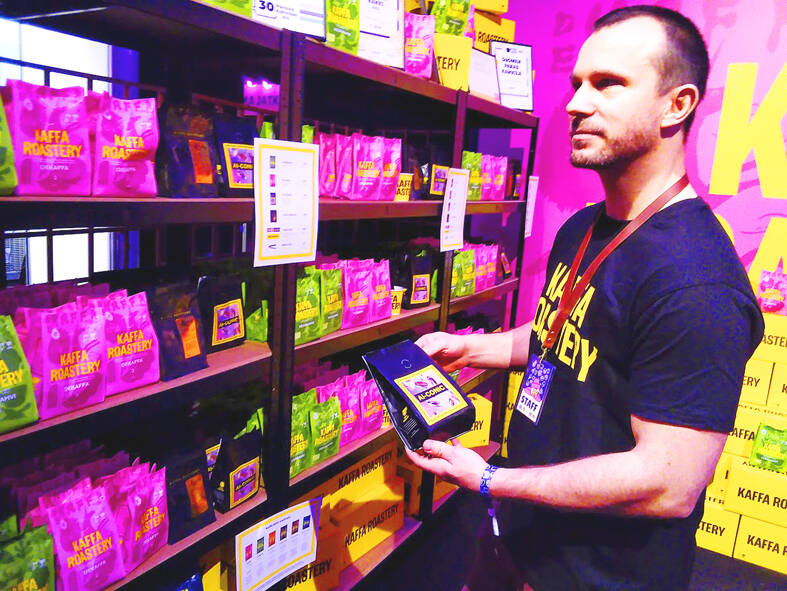An artisan roastery based in the capital of Finland has introduced a coffee blend developed by artificial intelligence (AI) in a trial in which it is hoped that technology can ease the workload in a sector that traditionally prides itself on manual work.
It is only apt that the Helsinki-based Kaffa Roastery’s “AI-conic” blend was launched last week in Finland.
The Nordic nation of 5.6 million consumes the most coffee in the world, at 12kg per capita annually, International Coffee Organization data showed.

Photo: AP
The blend — an AI-picked mixture with four types of beans, dominated by Brazil’s velvety Fazenda Pinhal — is the end result of a joint project by Kaffa, Finland’s third-largest coffee roastery, and local AI consultancy Elev.
“Leveraging models akin to ChatGPT and Copilot, the AI was tasked with crafting a blend that would ideally suit coffee enthusiasts’ tastes, pushing the boundaries of conventional flavor combinations,” Elev said.
The two partners wanted to trial how AI and its different tools could be of help in coffee roasting, a traditional artisan profession that is highly valued in Finland, Kaffa Roastery managing director and founder Svante Hampf said on Saturday.
“We basically gave descriptions of all our coffee types and their flavors to AI and instructed it to create a new exciting blend,” Hampf said during the Helsinki Coffee Festival that brings together roasteries and coffee aficionados annually.
In addition to coming up with its chosen mixture of beans from Brazil, Colombia, Ethiopia and Guatemala, AI created the coffee package label and a detailed taste description saying “AI-conic” is “a well-balanced blend of sweetness and ripe fruit.”
Hampf said he was surprised that AI “somewhat weirdly” chose to make the blend out of four different types of coffee beans, rather than the usual two or three, which allows distinction in taste between flavors from different origins.
However, after the first test roasting and blind testing, Kaffa’s coffee experts agreed that the tech-assisted blend was perfect and did not need human adjustments.
“AI-conic is a tangible example of how AI can introduce new perspectives to seasoned professionals,” Elev spokesman Antti Merilehto said while he offered coffee lovers new taste experiences.
Kaffa Roastery said that it hopes the trial can serve as a dialogue opener between coffee professionals of things to come in the future in Finland, a nation that has a strong coffee culture and a passion for technology with a flourishing start-up scene.

Semiconductor shares in China surged yesterday after Reuters reported the US had ordered chipmaking giant Taiwan Semiconductor Manufacturing Co (TSMC, 台積電) to halt shipments of advanced chips to Chinese customers, which investors believe could accelerate Beijing’s self-reliance efforts. TSMC yesterday started to suspend shipments of certain sophisticated chips to some Chinese clients after receiving a letter from the US Department of Commerce imposing export restrictions on those products, Reuters reported on Sunday, citing an unnamed source. The US imposed export restrictions on TSMC’s 7-nanometer or more advanced designs, Reuters reported. Investors figured that would encourage authorities to support China’s industry and bought shares

TECH WAR CONTINUES: The suspension of TSMC AI chips and GPUs would be a heavy blow to China’s chip designers and would affect its competitive edge Taiwan Semiconductor Manufacturing Co (TSMC, 台積電), the world’s biggest contract chipmaker, is reportedly to halt supply of artificial intelligence (AI) chips and graphics processing units (GPUs) made on 7-nanometer or more advanced process technologies from next week in order to comply with US Department of Commerce rules. TSMC has sent e-mails to its Chinese AI customers, informing them about the suspension starting on Monday, Chinese online news outlet Ijiwei.com (愛集微) reported yesterday. The US Department of Commerce has not formally unveiled further semiconductor measures against China yet. “TSMC does not comment on market rumors. TSMC is a law-abiding company and we are

FLEXIBLE: Taiwan can develop its own ground station equipment, and has highly competitive manufacturers and suppliers with diversified production, the MOEA said The Ministry of Economic Affairs (MOEA) yesterday disputed reports that suppliers to US-based Space Exploration Technologies Corp (SpaceX) had been asked to move production out of Taiwan. Reuters had reported on Tuesday last week that Elon Musk-owned SpaceX had asked their manufacturers to produce outside of Taiwan given geopolitical risks and that at least one Taiwanese supplier had been pushed to relocate production to Vietnam. SpaceX’s requests place a renewed focus on the contentious relationship Musk has had with Taiwan, especially after he said last year that Taiwan is an “integral part” of China, sparking sharp criticism from Taiwanese authorities. The ministry said

US President Joe Biden’s administration is racing to complete CHIPS and Science Act agreements with companies such as Intel Corp and Samsung Electronics Co, aiming to shore up one of its signature initiatives before US president-elect Donald Trump enters the White House. The US Department of Commerce has allocated more than 90 percent of the US$39 billion in grants under the act, a landmark law enacted in 2022 designed to rebuild the domestic chip industry. However, the agency has only announced one binding agreement so far. The next two months would prove critical for more than 20 companies still in the process